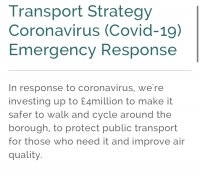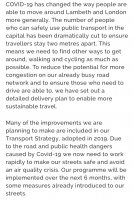So what do you think is the best way to achieve it?
It's really not my proposals we're discussing here, it's what Lambeth are currently planning that matter.
I'm not going to duck the question, I can but try to answer, but I'm not part of a group with a rehearsed position, and temperamentally I'm far more comfortable with deconstructing than I am with blue sky thinking. So I suspect I'm about to dig myself a hole, but here goes. I hope no-one can be bothered to read it.
Start from a place that prioritises public acceptance and accountability, which I think means class based equity as well as emphasising acceptance and accommodation of minority viewpoints and of course Equalities and Disabilities legislation, policy and so on. For all to gain some have to lose, but that has to be seen as fair. IOW best practice- I'm not attempting to write a comprehensive, watertight policy paper, I hope you get the drift.
Identify root problems- I've mentioned some above, ' pollution, noise, congestion, danger ', everyone can add to or reorder that list easily enough, we all recognise the problems
And root causes, which could start with through commuting, massive vehicles with huge engines as well as human behaviour.
Clear objectives, aiming to improve climate change, pollution related illness and premature death, road casualties, and other measurables.
Encourage improved quality of life, access to mobility but with better journey times, healthy lifestyles, better streetscapes.
Underpin with resilience and redundancy, which are sorely lacking from the impermeable neighbourhood proposals, and a systematic approach.
And there's real urgency.
There's huge amounts of work and evidence about all that, most of which I haven't read, though I'm unconvinced it all starts from what I see as the priorities.
Zonal extension of the CC and LEZ based on London road rationing- annual allowance calculated on some combination of home location, vehicle footprint, engine size, road usage. Initially administered via ANPR, vehicles are already databased on every journey, this simply extends that. Tradeable, because we live under capitalism, so those without a car can sell their credits to someone else, including those who want to commute into London (personally I'd vote to ban them completely but suspect I'd lose). Ideally moving towards a per adult basis, but that isn't quickly realisable and probably wouldn't be popular, so probably household based using Council Tax and DVLA databases.
I'll see what others think, but an approach of that sort at least makes an attempt to substantially hammer the main issues.
Beyond that, I'd like to see local logistics hubs, where packages are sorted for onward delivery by foot, cargo bike, drone, robot etc. If you like you could paint everything red and label it Post Office.
I doubt there'll ever be taxi ranks, but there's no real reason why most people couldn't walk to their nearest main road if they don't want cars in their street. They walk to their zip car.
I certainly want more dedicated cycle space and properly labelled quiet routes, but the infrastructure - and I give those on this thread credit where it's due- has improved massively and covid will certainly spur that on.
I'd like to see equitable resident vehicle parking arrangements- I can see no good reason why residents of some streets pay more or less than others for equivalent static road space. That should be London wide, although that's a massively hard sell.
I'll vote to ban SUVs immediately.
There's more but that'll do. None of it involves gentrified impermeable areas and sacrificial arteries where all the displaced probelms end up in the lungs and lives of people who have no other choice but to live there.
None of this can be implemented in the next few weeks, without public consultation. That's both a bad and a good thing.
It's unrealistic pie in the sky, of course it is, but that's taken me hours to write, and I can pick huge holes in it, but it's a sunny day and I've been seeing notifications come in for the thread and I haven't read any of it. l8r










